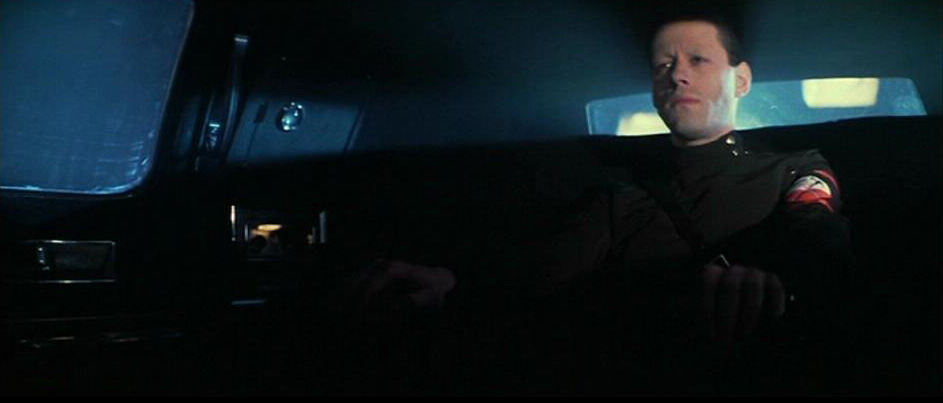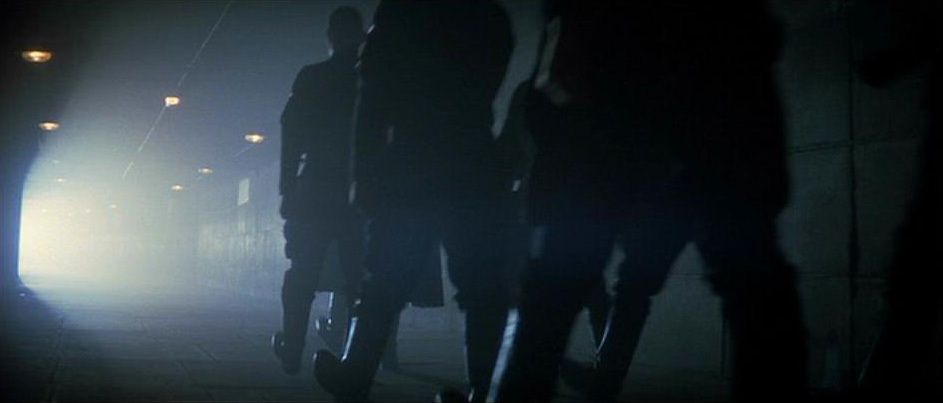The Show Must Go On
[David Gilmour]Ooooh, Ma, Oooh Pa
Must the show go on?
Ooooh, Pa. Take me home
Ooooh, Ma. Let me go
Do I have to stand up
{Wild eyed in the spotlight?
What a nightmare. Why
Don't I turn and run.}
There must be some mistake
I didn't mean to let them
Take away my soul.
Am I too old, is it too late?
Ooooh, Ma, Ooooh Pa,
Where has the feeling gone?
Ooooh, Ma, Ooooh Pa,
Will I remember the song?
The show must go on.
Song In A Sentence:
With different drugs warring within his body, thoughts of war and childhood reeling within his head, and his bricks dragging him further into mental decay, Pink wonders whether he can perform at his concert as expected before deciding that the show must go on.

I
n the brief moments after being resuscitated from his self-induced comatose state and before taking the stage at his concert, Pink experiences a moment of mental clarity in which that last vestige of sanity only briefly given a voice in previous songs breaks through to appraise his current state. While the theatrical style of the song stands in contrast to the ethereal “Comfortably Numb,” it serves well as a prelude to the over-the-top quality of the album’s last half. In one sense it’s only fitting that “the Show Must Go On” is written with such Flesh2-1choral theatricality considering that Pink, much like an actor waiting in the wing’s of the playhouse, is about to take the stage of his own concert. This idea of rock-star-as-actor has been touched on throughout the Wall, most notably in the imagery of the “disguise” that in the beginning Pink invites his audience to claw their way through. The theatrical spectacle of the album’s last half conveys the larger-than-life persona that Pink adopts for himself. Yet undercutting the musical showiness is an idea that is equally prevalent throughout the album – that of the hollowness of such illusions. This face that Pink puts on for his fans, after all, is merely another mask, a disguise, a persona covering over the rather flawed, human soul beneath. So while its theatricality creates a bombastic air, the lyrics reveal the very stunted, very apprehensive, very human individual beneath.
Part of Pink’s human frailty is placed front and center in the childish tantrum of the choir’s lyrics, crying for “Ma” and “Pa” to “take me home” and “let me go.” Not the first time he’s reverted back to childlike emotions when stuck at an impasse, here Pink seemingly calls out for mommy and daddy to rescue him from the life and the wall he has created. Ideas of home again resurface, but as before Pink is no closer to finding that personal center of calm he’s longed for. Instead, the choir, like a misbehaving child, calls out for “Ma [to] let me go,” possibly referencing his mother’s overprotective grasp as well as his partial desire to be released from life itself (whether symbolically, through his wall, or literally, through suicide).

The italicized lyrics above (printed in the album artwork, sung in concert, yet cut from the album mix of the song) equates the blinding spotlights of his stage show with that of the constant scrutiny of stardom, his “wild eye[s]” reminiscent of his drugged-out stare in “Nobody Home.” Not merely apprehensive about performing in his current state, Pink is terrified, wanting nothing more than to “turn and run” and retreat back into himself. In the lyrics that actually made it to the album, Pink sings of the impending “show” in a way that alludes to both his concert and his wall. The ambiguous “they” pops up once again in Pink’s questioning, much as it did during the verses of “Mother.” Here he sings how he “didn’t mean to let them take away my soul,” though never clarifies if the “them” is the audience at his concert, for whom he feels he must put on the mask of Rock Star; his record company, at whose beck and call he feels he must perform; or even the bricks of his wall, which, piece by piece, have robbed him of the person he could have been. Likewise, the missing “feeling” could refer to just about anything, from the (now absent) ambition he once had to be a famous rock star, to the feelings that inspired the songs he crafted (most songwriters note that their songs become less emotional / meaningful for them the more they perform it, and understandably so), or even something akin to that “fleeting glimpse,” feelings that he once had within his grasp but lost in the shadow of his wall. Paralleling the line in “Mother” in which he asks if Flesh2-2″they’ll like this song,” Pink finally wonders if he’ll even be able to perform in the state he’s in, asking “Will I remember the song?” Despite the deck being stacked against him, Pink concludes with that old theatrical adage that “the show must go on,” readying himself to take to the stage in “In the Flesh.”
Taking a more figurative approach to the final line casts “the Show Must Go On” as Pink’s own “To be or not to be” soliloquy from Hamlet. In this moment of (near) mental clarity, Pink begins to realize the truly deleterious effects of his wall, singing how it has taken away his individuality (“my soul”) and his emotions, his humanity (“the feeling”). For a brief second he is faced not only with the consequences of his actions but also the fateful decision of what to do next. Though at first he wants nothing more than for Ma and Pa to “take me home” and “let me go,” rather than “turn and run” Pink decides that he must go on with the path and the persona he’s created for himself – a path that will quickly lead to decay and moral corruption, but ultimately redemption.

What Other Floydians Have Said
"I think the part that says 'Ooooh, Ma, Ooooh, Pa / Must the show go on? / Ooooh, Pa. Take me Home' relates heavily to suicide. 'Must the show go on?' is fairly obvious, since 'the show' has been a metaphor for life throughout the movie. However, when Pink says 'Take me home', he is asking his father to take him home *with him*, that is, to take Pink wherever it is he (the father) has gone, in other words, death (or any possible redemption or alternate reality, like heaven, that would be found afterwards)." - Daniel Brod

